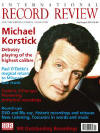Texte paru dans: / Appeared in:
*

International Record Review - (07-08//2013)
Pour
s'abonner / Subscription information
Onyx Classics
ONY4114

Code-barres / Barcode: 0880040411420
We essentially have J. S. Bach’s implicit permission to arrange his works away from their original context, as he did with both his own music and the music of others, and Viktoria Mullova and Ottavio Dantone present an album that does just that. In addition to the two canonical concertos for solo violin, this disc includes another, an arrangement of Bach’s E major Keyboard Concerto, BWV1053. More unconventional is the treatment of the double Concerto, BWV1060, usually given to violin and oboe and occasionally violin duet, but here shared between violin and harpsichord. Do the arrangements work? Well, it’s debatable, but when they’re played as well as they are here, it barely matters.
The Violin Concertos in E major and A minor are served wonderfully. Both performances are transparent and light but always expressively engaging. Mullova is pushed forward in the balance, relative to the musicians of Accademia Bizantina, but it’s proof of her credentials as a chamber musician that her contribution feels like the first among equals. A brief interaction with Dantone’s continuo in the first movement of the E major finds Mullova revealing tremendous depth of feeling — quite contrast to the oft-repeated accusation of coldness at the heart of her playing. Mullova and her colleagues introduce little unexpected dynamic contrasts to the A minor Concerto that speak volumes for their imagination and collective purpose. These recordings are preferable to Mullova’s previous versions of these pieces - Onyx’s creamy reverberant acoustic is superior to Philips’s rather stark production on the earlier disc.
Swapping the solo instrument in a Bach concerto is not a
new trick, though I’ve not come across a version of the E major Keyboard
Concerto for violin before. Unlike the Keyboard Concerto in
D minor, BWV1052, there doesn’t seem to be a suggestion that the E major was
intended to be played on the instrument and Dantone explains in his booklet
notes that he took his cue from Bach’s arrangement of movements from the
concerto for cantatas. This arrangement drops the piece down to D major to
allow it to sit more comfortably in the violin. Mullova adopts a very
similar pace to that which she chooses for BWV1042; as BWV1053 follows 1042
on the disc, I wonder if a swifter speed would have helped differentiate the
two. There’s also a slight feeling of sluggishness here, perhaps because of
the greater use of the harpsichord as a continuo instrument. The slow
movement is a real highlight, though: the long doleful melody is very well
suited to the violin and the harpsichord is used very sensitively.
I’m a little less sure of the success of the double concerto, BWV106O, as a piece for harpsichord and violin. Mullova’s prominent place in the mix gives the impression that she’s duetting with the continuo and that we’ve really been given only half the material. That said, the performance is as finely turned as any of the others and, reservations about arrangements aside, this is a very fine Bach disc. Readers can try before they buy: Onyx offers some very generous track samples on its website, in addition to an expanded text of Dantone’s notes.
Cliquez l'un ou l'autre
bouton pour découvrir bien d'autres critiques de CD
Click either button for many other reviews


